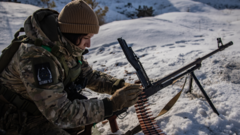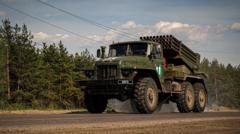In a breakthrough statement that defies earlier tensions, the Democratic Republic of Congo (DRC) and the Rwanda-backed M23 militia have pledged to end hostilities that have plagued their border regions since January. The exclusive announcement was released late Wednesday, marking a significant turn in the ongoing conflict which has claimed thousands of lives.
Congo and M23 Reach Unlikely Ceasefire Agreement

Congo and M23 Reach Unlikely Ceasefire Agreement
In a surprising development, the Democratic Republic of Congo and the M23 militia announce a commitment to cease hostilities amidst a long-standing conflict.
President Felix Tshisekedi of Congo, who previously asserted that dialogue with M23 was unlikely, has now agreed to work towards a permanent peace settlement involving the militia. The joint statement between the two parties reflects a mutual “commitment to an immediate cessation of hostilities,” a stance hailed as “unprecedented” by experts like Fred Bauma of the Congolese research institute Ebuteli.
Critics, particularly from the United States and United Nations, have accused Rwanda of supporting M23 militarily and financially, allegations that Rwanda vehemently denies. This development comes in the shadow of historical tensions rooted in a humanitarian crisis that triggered the Rwandan genocide in the mid-1990s, leading millions to seek refuge in Congo and igniting subsequent wars.
This ceasefire agreement signifies a glimmer of hope for lasting peace in a region long scarred by warfare, where hostilities have reportedly escalated significantly in recent months, jeopardizing countless lives and livelihoods. As both parties embark on this new path, the international community watches closely, hoping for a reduction in violence and a chance for meaningful negotiations.
Critics, particularly from the United States and United Nations, have accused Rwanda of supporting M23 militarily and financially, allegations that Rwanda vehemently denies. This development comes in the shadow of historical tensions rooted in a humanitarian crisis that triggered the Rwandan genocide in the mid-1990s, leading millions to seek refuge in Congo and igniting subsequent wars.
This ceasefire agreement signifies a glimmer of hope for lasting peace in a region long scarred by warfare, where hostilities have reportedly escalated significantly in recent months, jeopardizing countless lives and livelihoods. As both parties embark on this new path, the international community watches closely, hoping for a reduction in violence and a chance for meaningful negotiations.















